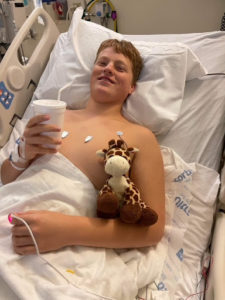CLINTON, Mo. – A Missouri teenager is the first KC-area adolescent to undergo a revolutionary heart procedure that many doctors believe could replace open-heart surgery.
Mason Munsch, 15, from Clinton, Missouri, is the first youth in the Kansas City region to receive a Harmony Transcatheter Pulmonary Valve (TPV) System. The procedure was performed at Children’s Mercy Hospital in Kansas City and is considered minimally invasive.
The TPV system serves as a supplemental pulmonary valve and is designed to treat irregular or insufficient blood flow from the heart’s right ventricle to the lungs.
Mason’s mother, Rachel Munsch, told The Heartlander that when her son was born, he was diagnosed with pulmonary atresia with an intact ventricular septum – a rare form of congenital heart disease in which the pulmonary valve doesn’t form properly. The disease accounts for less than 1% of all heart defects.
Munsch said Mason’s pulmonary valve did not form correctly during pregnancy and fused itself shut. This blocked oxygenated blood from flowing from his lungs to his heart, which led doctors to administer aid shortly after he was born. A balloon was then inserted into Mason when he was just two weeks old to help his heart and lungs receive proper blood flow.
At 7 months old, a team of doctors completely removed Mason’s pulmonary valve, which he lived without until he was 15 years old. Once his heart began to grow and reach the size of an adult’s, his risk of heart attack, stroke or total heart failure increased without the valve, putting pressure on doctors to figure out a solution.
The initial decision was to complete an open-heart surgery, until several tests came back and showed Mason was the perfect candidate for a Harmony Valve transplant. The surgery is considered revolutionary by many doctors, and could be an alternative to open-heart surgery for a large percentage of patients.
According to Munsch, doctors came all the way from Stanford University to witness the one-of-a-kind surgery on Mason.
Through a small incision in Mason’s leg, the new Harmony Valve was loaded into a catheter guided by X-ray and started making its way to his heart. Once it arrived at the heart, it began working properly and the family’s worst fears had been averted.
Although he will have to keep taking aspirin to avoid future blood clots, the valve should last anywhere from seven to ten years before it eventually fails, according to his mother. Once it fails, another valve will be placed inside the current one to keep Mason’s heart functioning properly.

“Hopefully we avoid another open heart surgery in seven to 10 years,” Munsch said. “They’ll keep doing harmony valves until we’ve gotten too small. Once we get too small is when they will have to open it up and clean him all out and start fresh. Hopefully, we bought him decades.”
Other than the valve tickling his heart and causing an abnormal rhythm shortly after the procedure, Munsch said her son’s body adapted to the new Harmony Valve well.
“His heart was like, ‘Whoa, this is not normal. Something is going on.’ They did have to give him medicine to straighten out his heart rate, but he was only on that medicine for a week or week and a half,” she said. “We went back to the cardiologist and he said everything looks fine and we don’t have to do the medicine anymore.”
Munsch said her son is doing well after the surgery and is living life like a normal teenager. He’s allowed to do anything he feels he can do with no physical restrictions, and has recently spent time playing baseball and lifting weights with his brother.
“He can walk up and down our stairs without being out of breath,” his mother said. “He doesn’t sweat. He used to sweat all the time. He actually gets cold, which is weird. Looking back, I never even thought it was weird, but he never used to get cold.
“It’s amazing watching how good he feels. He has never used anything he has been through as an excuse. I wish everyone could know Mason the way that I know Mason.”

